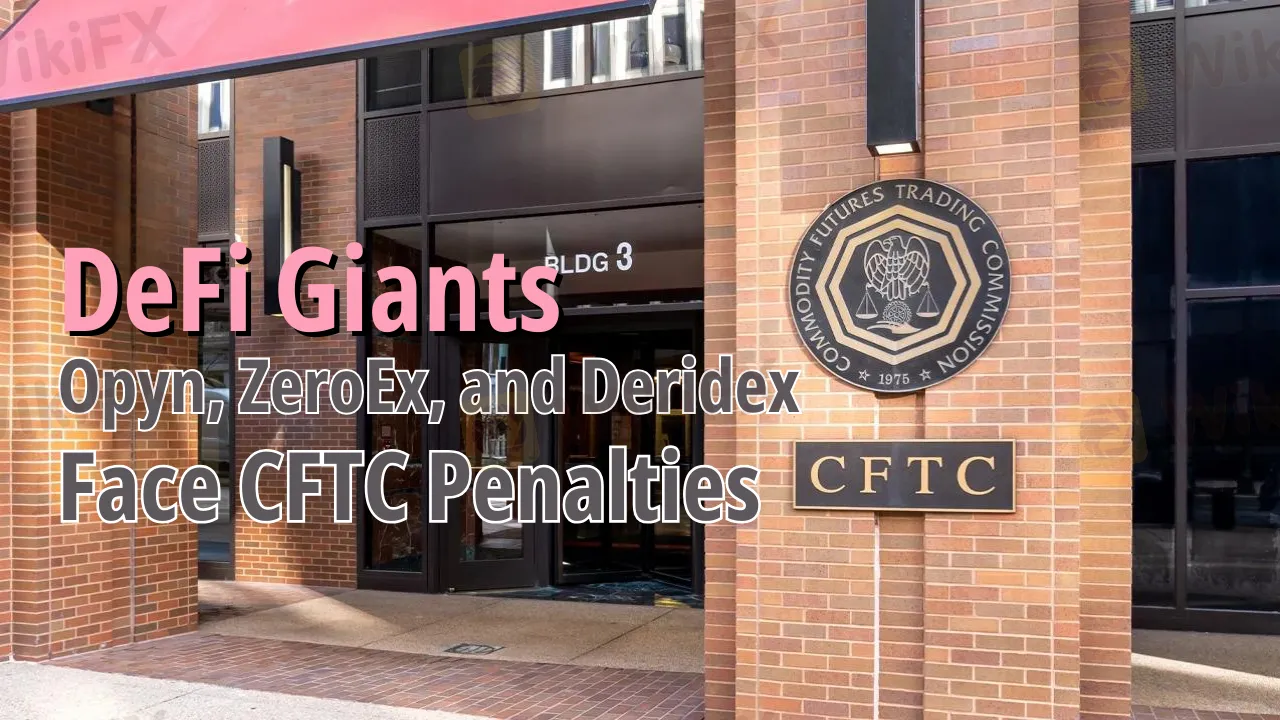简体中文
繁體中文
English
Pусский
日本語
ภาษาไทย
Tiếng Việt
Bahasa Indonesia
Español
हिन्दी
Filippiiniläinen
Français
Deutsch
Português
Türkçe
한국어
العربية
DeFi Giants Opyn, ZeroEx, and Deridex Face CFTC Penalties
Abstract:DeFi leaders Opyn, ZeroEx, and Deridex face CFTC enforcement actions for various violations, highlighting regulatory scrutiny in the decentralized finance realm. Stay informed with the latest in forex through the WikiFX App.

In the ever-evolving world of decentralized finance (DeFi), three major players - Opyn, ZeroEx, and Deridex - have recently been handed enforcement actions by the Commodity Futures Trading Commission (CFTC). These companies have been charged with several violations, emphasizing the CFTC's continuous scrutiny of the DeFi landscape.
The Charges and Penalties
Both Deridex and Opyn are facing penalties for failing to register as a swap execution facility (SEF) or designated contract market (DCM). Furthermore, they were charged for not adopting a customer identification program, which is part of the Bank Secrecy Act compliance program for futures commission merchants (FCMs). ZeroEx, alongside the other two, also faces charges for unlawfully offering leveraged and margined retail commodity transactions in digital assets.

As a consequence, the three firms have been mandated to pay civil monetary penalties. Opyn is set to pay $250,000, ZeroEx will pay $200,000, and Deridex owes $100,000. They are also mandated to halt any violations of the Commodity Exchange Act (CEA) and CFTC regulations.
Deep Dive: The Companies and Their Operations
Opyn, Inc. had launched the Opyn Protocol which facilitated the trading of a digital asset derivative token called oSQTH. This token's value was pegged to an index (Squeeth) that tracked the square of ether's price relative to the USDC stablecoin. The issue arose when it was determined that these tokens acted as swaps and leveraged retail commodity transactions. The CFTC stated that such transactions can only be presented to retail users through a registered exchange. Opyn also did not sufficiently block U.S. users from accessing its protocol.

Deridex, Inc. operated a blockchain-based protocol offering “perpetual contracts.” These contracts can be termed as swaps and, similar to Opyn's issue, must only be offered on a registered exchange. Deridex also took no precautions to exclude U.S. citizens from accessing its protocol.

ZeroEx Inc. on the other hand, introduced a protocol and a front-end application (Matcha) that allowed users to trade digital assets on multiple blockchains. Some of these digital assets provided traders with approximately 2:1 leveraged exposure to renowned digital assets like ether and bitcoin. This was in direct violation of CFTC regulations.

Bright Side of Cooperation
Despite the hefty penalties, the CFTC acknowledged the cooperation extended by all three companies during the Division of Enforcement's investigation. This proactive stance from the firms resulted in a reduction of their respective civil monetary penalties.
For those keen on staying updated with the latest happenings in the forex market, consider installing the WikiFX App. With the DeFi landscape continuously evolving, it's essential to remain informed, ensuring that both investments and operations align with regulatory requirements.
Download the App here: https://www.wikifx.com/en/download.html

Disclaimer:
The views in this article only represent the author's personal views, and do not constitute investment advice on this platform. This platform does not guarantee the accuracy, completeness and timeliness of the information in the article, and will not be liable for any loss caused by the use of or reliance on the information in the article.
Read more

Anti-Scam Groups Urge Tougher Action on Fraudsters in UK
Anti-scam groups demand tougher police action on fraudsters as UK fraud rates surge 19%, targeting millions in a penalty-free crime spree exposed by a $35m scam leak.

Philippines Deports 29 Indonesians Linked to Online Scam Syndicate in Manila
Online scam groups in the Philippines trick Filipinos into gambling and love scams, from Manila to Bacolod, causing trafficking and pain as police fight back.

How Reliable Are AI Forex Trading Signals From Regulated Brokers?
Discover how reliable AI Forex trading signals are and why using a regulated broker boosts their effectiveness. Learn key factors to evaluate accuracy and enhance your trading.

Top Currency Pairs to Watch for Profit This Week - March 31, 2025
Discover the top 5 currency pairs to trade for profit this week, March 31, 2025—USD/JPY, EUR/USD, GBP/USD, AUD/USD, USD/CHF—with simple strategies and best times.
WikiFX Broker
Latest News
How Crypto Trading Transforms FX and CFD Brokerage Industry
UK would not hesitate to retaliate against US tariffs - No 10 sources
FCA Warns Against 10 Unlicensed or Clone Firms
CySEC Warns Against 14 Unlicensed Investment Websites
Top Currency Pairs to Watch for Profit This Week - March 31, 2025
Will natural disasters have an impact on the forex market?
Philippines Deports 29 Indonesians Linked to Online Scam Syndicate in Manila
Navigating the Intersection of Forex Markets, AI Technology, and Fintech
Exposed: Deceptive World of Fake Trading Gurus – Don’t Get Fooled!
AI-Powered Strategies to Improve Profits in Forex Trading
Currency Calculator







